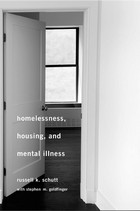
Humans are social animals and, in general, don’t thrive in isolated environments. Homeless people, many of whom suffer from serious mental illnesses, often live socially isolated on the streets or in shelters. Homelessness, Housing, and Mental Illness describes a carefully designed large-scale study to assess how well these people do when attempts are made to reduce their social isolation and integrate them into the community.
Should homeless mentally ill people be provided with the type of housing they want or with what clinicians think they need? Is residential staff necessary? Are roommates advantageous? How is community integration affected by substance abuse, psychiatric diagnoses, and cognitive functioning? Homelessness, Housing, and Mental Illness answers these questions and reexamines the assumptions behind housing policies that support the preference of most homeless mentally ill people to live alone in independent apartments. The analysis shows that living alone reduces housing retention as well as cognitive functioning, while group homes improve these critical outcomes. Throughout the book, Russell Schutt explores the meaning and value of community for our most fragile citizens.

Your doctor is the second most important person taking care of your health. You're the first. This book was written so that you can do a better job, without going to medical school. It is designed to help you sort out the vital health information you need--what to consider, what to ignore, what to worry about, what to forget.
Deciding how to take care of a pain, an injury, a fever--and whether to call in expert advice--is not always an easy task. Knowing how to prevent disease can be even harder: Will I really live longer and feel better if I cut down on dietary fat, or alcohol, or overwork? The main focus of this book is on prevention: habits you can modify, choices you can make in daily life. Good choices do make a difference. The life expectancy of American adults has been increasing, and it is quite clear that professional medical care is not the only reason people are living longer.
But when you do call in the professionals, this book will guide you in asking the right questions about your diagnosis and treatment. When medical decisions must be made, you can be an active partner in making them.
The doctors who wrote this book have made some fundamental assumptions about their readers: they are people who want to make their own choices about their health, based on the best possible evidence; they want straightforward information unencumbered with excessive detail; when they talk with their physician, they want to ask intelligent questions and understand the answers; they want to live a long life, but also enjoy it along the way; and they want to see "the big picture"--how their personal health is affected by environmental and social forces.
READERS
Browse our collection.
PUBLISHERS
See BiblioVault's publisher services.
STUDENT SERVICES
Files for college accessibility offices.
UChicago Accessibility Resources
home | accessibility | search | about | contact us
BiblioVault ® 2001 - 2024
The University of Chicago Press









